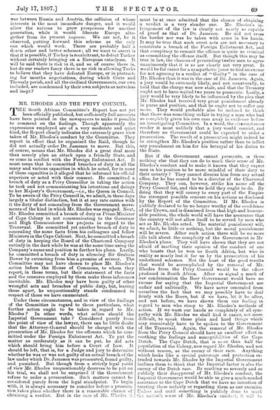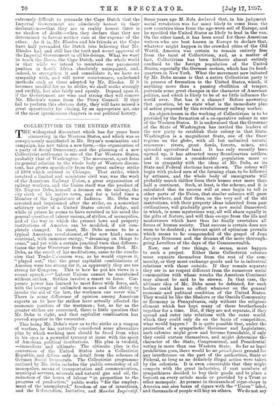MR. RHODES AND THE PRIVY COUNCIL. T HE South African Committee's
Report has not yet been officially published, but sufficiently full accounts have been printed in the newspapers to make it possible to comment on the findings. Though apparently the expressions employed are of a very moderate and quiet kind, the Report clearly indicates the extremely grave view taken of Mr. Rhodes's conduct by the Committee. They report in effect that he organised the Raid, though he did not actually order Dr. Jameson to move. But this, of course, means that Mr. Rhodes did a great deal more than merely plan an attack upon a friendly State, and so come in conflict with the Foreign Enlistment Act. It must mean that he committed breaches of duty in all the many and various capacities in which he acted, for in none of these capacities is it alleged that he informed his official superiors or acted with their consent. He committed a breach of duty as a Privy Councillor in taking the action he took and not communicating his intentions and doings to her Majesty's Government, —i.e., the Queen in Council. To be sworn of the Privy Council is, we admit, in these days largely a titular distinction, but it at any rate carries with it the duty of not concealing from the Government move- ments of the kind in which Mr. Rhodes was engaged. Next, Mr. Rhodes committed a breach of duty as Prime Minister of Cape Colony in not communicating to the Governor and High Commissioner his projects in regard to the Transvaal. He committed yet another breach of duty in concealing the same facts from his colleagues and fellow Ministers in the Cape Cabinet. Next, he committed a breach of duty in keeping the Board of the Chartered Company entirely in the dark while be was at the same time using the Company's name and position to further his plans. Lastly, be committed a breach of duty in silencing Sir Graham Bower by extracting from him a promise of secrecy. The Committee may not have chosen to place Mr. Rhodes's action before the House of Commons, to whom they report, in these terms, but their statement of the facts and the censures employed by them make these inferences inevitable. Mr. Rhodes may have been guilty of other wrongful acts and breaches of public duty, but, leaving these apart, he unquestionably stands condemned in respect of those we have enumerated.
Under these circumstances, and in view of the findings of the Committee in regard to these .particulars, what further action ought to be taken in regard to Mr. Rhodes ? In other words, what action should the Imperial Government take ? Considered purely from the point of view of the lawyer, there can be little doubt that the Attorney-General should be charged with the prosecution of Mr. Rhodes for the offences which he com- mitted under the Foreign Enlistment Act. To put the matter as moderately as it can be put, he did acts which should bring him before a Court of Law. It should be left, that is, for a Judge and jury to determine whether he was or was not guilty of an actual breach of the law under which Dr. Jameson was prosecuted, found guilty, and punished. But though from a. strictly legal point of view Mr. Rhodes unquestionably deserves to be put on his trial, we shall not be surprised if the Government refuse to order a prosecution. Such matters cannot be considered purely from the legal standpoint. To begin with, it is always necessary to consider before a prosecu- tion takes place whether there is a reasonable chance of obtaining a verdict. But in the case of Mr. Rhodes it must be at once admitted that the chance of obtaining a verdict is a very slender one. Mr. Rhodes's in- fringement of the law is clearly not nearly so capable of proof as that of Dr. Jameson. He did not cross the border nor was he taken with arms in his hands. It may be true that such overt acts are not necessary to constitute a. breach of the Foreign Enlistment Act, and that conspiracy to commit the offence is quite as criminal as committing the offence itself. But though this may be true in law, the chances of persuading twelve men to agree unanimously that it is so are clearly not very great. It would be far easier for a sympathetic juror to find an excuse for not agreeing to a verdict of " Guilty " in the case of Mr. Rhodes than it was in the case of Dr. Jameson. Again, a jury would be extremely likely, and not unnaturally, to hold that the charge was now stale, and that the Treasury ought not to have waited two years to prosecute. Lastly, a jury would be very likely to be influenced by the plea that Mr. Rhodes had received very great punishment already in purse and position, and that lie ought not to suffer any more. They would probably also be inclined to think that there was something unfair in trying a man who had so completely given his own case away in evidence before an investigating Committee. In a word, the eireumstances render it most unlikely that a jury would convict, and therefore no Government could be expected to order a prosecution. The result of a prosecution might indeed be to strengthen Mr. Rhodes's position rather than to inflict any punishment on him for his betrayal of his duties to the State.
But if the Government cannot prosecute, is there nothing else that they can do to mark their sense of Mr. Rhodes's conduct and to make it known that they expect men in his position to be more mindful of their duty to their country ? They cannot dismiss him from any actual office, for he has ceased to be a director of the Chartered Company. They can, however, strike his name off the Privy Council list, and this we hold they ought to do. By doing that they will convey to every part of the Empire the strongest possible censure on his actions as disclosed by the Report of the Committee. If Mr. Rhodes is publicly declared to be no longer worthy of the confidence of the Crown, and is dismissed from that high and honour- able position, the whole world will have the assurance that the country will not allow itself to be served by men who act as Mr. Rhodes acted. The material punishment will, we admit, be little or nothing, but the moral punishment will be severe. After such action there will be no more idle talk about the complicity of the Government in Mr Rhodes's plans. They will have shown that they are not afraid of marking their opinion of the conduct of one who boasts that he won us South Africa, but who in reality so nearly lost it for us by the prosecution of his underhand schemes. Not the least of the good results that would be accomplished by the removal of Mr. Rhodes from the Privy Council would be the effect. produced in South Africa. After so signal a, mark of our condemnation the Boer Government would have no excuse for saying that the Imperial Government are unfair and unfriendly. We have never concealed from ourselves the fact that we may possibly have to deal firmly with the Boers, but if we have, let it be after, and not before, we have shown them our feeling in regard to men who stoop to Mr. Rhodes's methods of. action. If we wash our hands so completely of all sym- pathy with Mr. Rhodes we shall find it easier, not more difficult, to 'speak those plain and hard things which, may conceivably have to be spoken to the Government of the Transvaal. Again, the removal of Mr. Rhodes from the Privy Council should have an excellent effect in soothing the feelings and susceptibilities of the Cape Dutch. The Cape Dutch, that is more than half the population of the Colony, now regard Mr. Rhodes, and not without reason, as the enemy of their race. Anything which looks like a special patronage and protection ex- tended towards Mr. Rhodes by the Imperial Government inclines them to think that the Imperial factor is also the enemy of the Dutch race. By marking so severely and so publicly their disapproval of Mr. Rhodes's conduct, the Imperial Government would be able to give a much-needed assurance to the Cape Dutch that we have no intention of treating them unfairly or regarding them as our enemies. Unless and until something is publicly done to mark the nation's sense of Mr. Rhodes's conduct, it will lie extremely difficult to persuade the Cape Dutch that the Imperial Government are absolutely honest in their declarations—that they are in reality honest there is no shadow of doubt—when they declare that they are determined to favour neither race at the expense of the -other. As it is, Mr. Rhodes and his friends at the Cape have half persuaded the Dutch into believing that Mr. Rhodes had and still has the tacit and secret approval of the Imperial Government in all his doings. What we want to teach the Boers, the Cape Dutch, and the whole world is that while we intend to maintain our paramount position in South Africa absolutely unimpaired, and, indeed, to strengthen it and consolidate it, we have no sympathy with, and will never countenance, underhand methods such as those adopted by Mr. Rhodes. If it becomes needful for us to strike, we shall' strike strongly and swiftly, but also fairly and openly. Depend upon it, if the Government are wise and strong they will remove Mr. Rhodes's name from the Privy Council. If they fail to perform this obvious duty, they will have missed a great opportunity for closing, by an appropriate act, one of the most ignominious chapters in our political history.



































 Previous page
Previous page